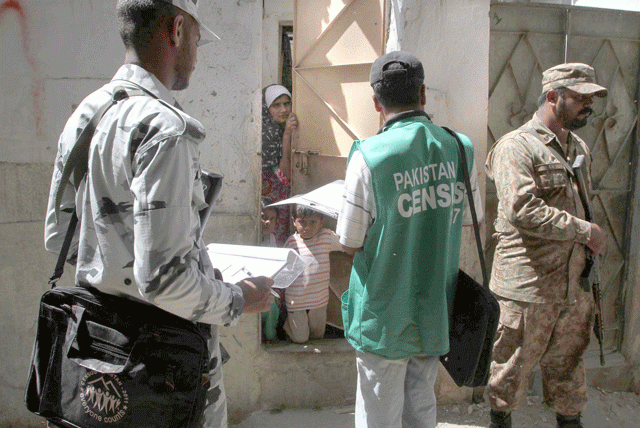PBS denies allegations of manipulating results to politically empower any province
Karachi's administrative boundaries unchanged since 1998, hence increase less than Lahore

A census team in Karachi. PHOTO: EXPRESS
In fact, the share of population of the Punjab province in the total has gone down effectively, reducing its seats in the National Assembly, the census commissioner told a two-judge bench, headed by Justice Munib Akhtar, during a hearing on a petition alleging deliberate irregularities to show Karachi's population less and seeking fresh national census through a judicial commission.
The census commissioner, Muhammad Ashraf Arain, assured the court that the PBS had conducted the 2017 census in a fair manner with ample opportunities given to the people to record their grievances about non-counting.
He argued that as per the provisional results of the 2017 census, Punjab's share in the total population had declined by 2.68%, while the population share of Khyber Pakhtunkhwa and Balochistan had increased and Sindh's share remained constant.
The provisional results maintained that Punjab's population decline will adversely impact the allocation of the number of seats to Punjab in the National Assembly as well as its share in the National Finance Commission award.
The report said that the key principle followed in the 2017 census was that only officially notified boundaries of administrative units were used. It said that in the case of Karachi, the city limits had not been extended by the provincial government department since 1998, except for a few dehs (villages).
6th census findings: 207 million and counting
On the other hand, the commissioner said the city limits of Lahore had been extended by the Punjab government in January, 2015, to the entire district of Lahore. Additionally, two union councils of Kasur district were added to Lahore city, according to the report.
The census commissioner said Karachi had a population of 9.34 million in 1998, adding that the city recorded a population of 14.91 million in the 2017 census, showing an increase of 59.66%. These figures suggested an average population growth rate of 2.49% between 1998 and 2017.
The officer said Lahore had a population of 5.14 million in 1998 and the city had recorded a population of 11.126 million in the 2017 census, showing a growth of 116.32%. These figures show an average population growth rate of 4.14% between 1998 and 2017.
Karachi up top, but not by much
It was argued that Lahore's population on the old, pre-2015, boundaries computes to 8.12 million, showing an increase of 57.93%. This suggested an average population growth rate of 2.43%.
The commissioner argued that in this manner it may be appreciated that the growth of Lahore was very much in the line with the growth in Karachi, and there was no conspiracy to modify the census results.
Replying to the allegations about the mechanism used in the 2017 census, Arain said the field operation was carried out by the local district management, which was responsible for enumeration of all the individuals in their areas of jurisdiction. "They were to ensure that field operations were carried out smoothly and every individual counted. Accordingly, they have furnished the certificate in this regard," the officer said.
The officer said the historical trends of the last three censuses had also been quoted in the preliminary/provisional results, which show the growth rates inline.
Why the census is important for Pakistan
The commissioner argued that there was no provision in the Constitution to hold a census every ten years, however, traditionally, the population and housing census was conducted after every ten years under Section 31 of the General Statistics (Re-Organisation) Act, 2011.
The commissioner said the petition was not maintainable for hearing and pleaded to the court to dispose of the plea. The bench sought a counter-affidavit from the petitioner, Syed Iqbal Kazmi, to the census commissioner's report.
Kazmi, the chairperson of the Pakistan Qaumi Movement, had challenged the census results of Karachi.


















COMMENTS
Comments are moderated and generally will be posted if they are on-topic and not abusive.
For more information, please see our Comments FAQ